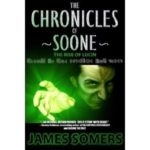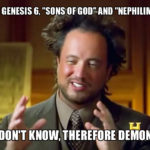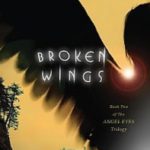Not Always Popular
Today we are going to discuss three distinctly Christian subgenres of speculative fiction and why they are not always popular with Christian readers of speculative fiction – such as myself, and possibly you. Feel free to share.
First, a disclaimer is in order. I am not, in principle, opposed to any of these genres, and as a reader I have at least  dabbled in all of them. I am certain that each one boasts some truly fine books. I am not saying that there is anything inherently inferior about such stories – let alone inherently wrong. It’s simply that I – playing the odds of what I am most likely to enjoy – don’t choose to read them anymore.
dabbled in all of them. I am certain that each one boasts some truly fine books. I am not saying that there is anything inherently inferior about such stories – let alone inherently wrong. It’s simply that I – playing the odds of what I am most likely to enjoy – don’t choose to read them anymore.
And now, enough disclaiming and onto the point. The three distinctly Christian subgenres are …
The End Times. Again: some fine books belong to each of these categories. Evan Angler’s excellent (and sadly discontinued) Swipe series is a shining illustration of the point. In the main, however, I don’t enjoy novels about the End Times. On the one hand, I find it dreary to read about relentless loss, tribulation, and cataclysm, culminating in the Anti-Christ’s conquest of the entire Earth; on the other hand, I find it predictable. It’s just mapping Revelation prophecies to the inevitable conclusion. I loved Angler’s End Times series, but I wasn’t sure it was an End Times series until the second book. Until then, I thought it might have been a dystopia flavored by apocalyptic prophecy – and hoped that it was.
The Nephilim. My instinctive response to the Nephilim subgenre is neutrality. I am not offended by the angel/human concept, and if you recast the essential idea in a sci-fi form – members of an incorporeal species assume physical bodies to interact with humanity, and interact to the point of reproducing – it’s actually pretty intriguing. (Question: In such a scenario, would the offspring really be hybrid? Because for reproduction to be possible, wouldn’t the assumed bodies have to be genetically human, perhaps with minor variations from the norm …?)
But – and how can I put this kindly? – novels about the Nephilim often take an extreme left turn into strangeness. UFOs, Roswell, tinfoil government conspiracies, monsters, aliens – sometimes all in the same book (I know – I read it). It’s all too much. The Nephilim subgenre also gives too much play to false readings of Scripture: one, that it was because of the Nephilim that God sent the Flood; two, that the Nephilim are somehow connected to the End Times. (In a cheap intellectual sleight of hand, some quote Jesus, “As it was in the days of Noah, so it will be in the days of the Son of Man” – leaving off the rest of the passage, where Christ explains in what way the days of the Son of Man will be like the days of Noah, and it isn’t the Nephilim.)
Angels v. Demons. I don’t question the poetic triumph of Paradise Lost, or the shrewd, sharp effectiveness of The Screwtape Letters. And it isn’t only the classics. This Present Darkness was one of my first loves in Christian speculative fiction. But over the years I cooled toward stories that give center stage to angels and demons. I admit, the last couple books I read in the genre did much of the cooling. Yet I think it is a general – not, of course, a universal – weakness of such stories to make angels too … human. I want a bit of grandeur or otherworldliness, a flavor of heaven or hell. It’s a tall order, and harder the larger the role. Even now, I think that angels (good and bad) can be well-used in fantastic fiction – but especially in roles that are somewhat marginal, or mysterious.
In my earlier years of reading, I wandered through these subgenres and ended at the conclusion that they are Not My Thing. It’s curious how easily they overlap. Somewhere, I know, they have converged entirely into an End Times novel where the Nephilim fight with demons against angels …











































Wasn’t the Nephilim kind of what that Nicholas Cage movie City of Angels was about? Lol. I was at a weight loss convention and we had a lively debate about why any angel would leave the glory of God’s presence for any human being–no matter how attractive. Some thought if movie star X would have them they’d give up Heaven for him. I was among the dissenters.
A big problem with writing angels is making them too anthropomorphic. I loved Lewis’s Screwtape Letters but the POV character was meant to be a cartoon you laugh at. The kind of entity you love to hate. Funny as it was it’s a good thing the work is as short as it is.
You can err in writing fallen angels by making them too sympathetic–or too grand like Milton did. You read the high falluting dialogue by Satan and his angels in Hell and wonder if Milton was thinking, “These rebels are in Hell. But man! Aren’t these bad boys awesome?”
For unfallen angels I just can’t imagine any personality completely devoid of sin. A similar problem with writing a Christ figure. Chalk it up to my imagination which is fallen like the rest of me.
I am trying to get around this by writing about angels from the human perspective. The Delusion by Laura Gallier is good about this.
I want to try to incorporate more subtlety into my ventures in this field. (If I go there.) Less like Frank Perretti and more like Henry James’s Turn of the Screw and some of Edith Wharton’s tales. Charles Williams also wrote great urban fantasy before it was a thing.
I might have to look up a couple of those authors you mentioned 🙂
I recommend All Hallow’s Eve and The Place of the Lion by Williams. But you can read his Many Dimensions on Gutenberg (Australian) for free.
I like the Nephilim and Angels vs Demons trope, but can be picky about how it’s done. End Times fiction is usually the one I’m less interested in, but could make exceptions for certain ones.
For angels and demons, it’s fun when authors give them a different psychology, concerns, rules to follow, etc. than humans, but only if it makes a reasonable amount of sense for the story world.
I once read this book about Nephilim called Flood: The Story of Noah and the Family Who Raised Him. But the guy was a hack writer.
In all seriousness though, I agree. Except… the angels-demons thing is just totally outside of what I’m interested in. I dislike it even more than End-Times stuff–although I’m pretty done with that, too. I do think the Nephilim thing is overdone, and most of the time it makes my eyes roll like bowling balls down an alleyway. But it can be handled in some cool ways, I think.
Amen to all three, Shannon. I’m with you and have, like you, had some in the genres you named, that surprised me. But by far, I’ve had more that really, really make me NOT want to read any more.
Becky
Shannon, thanks for this. I reached my fill of Nephilim in 2013 and I’ve not warmed to the critters at all since then. Quoting my 2013-era self:
End-times fiction I don’t mind so much, at least insofar as the Left Behind series is concerned. But I readily concede that a lot of this, for me, is plain nostalgia.
As for angels-versus-demons, I was actually thinking about this recently (and a fair bit negatively). I think the really great Christian-made fiction on supernatural/spiritual warfare began, peaked, and ended with Frank Peretti. We had a few imitators, but they always seemed to think like a 1996-era version of myself and think, “Hey, what if we had books like Frank Peretti’s ‘Darkness’ books, but with only angels-versus-demons and not so much those boring parts with the humans?” Of course, this was a fatal move for two reasons:
1. Biblically, because then to have some kind of a story, you must make the angels or demons more human-like, which stretches/breaks God’s worldbuilding for reality.
2. Story-wise, because the author ends up insisting that the story only tell us “heavenly things” without caring to tell us “earthly things,” and as a result readers must do the heavy lifting to try to believe either. Yet Peretti excelled in portraying small-town America and familiar, accessible settings while also challenging our imaginations re. spiritual warfare.
A few recent examples of spiritual-warfare fiction seem especially prone to this trope of over-spiritualizing the topic. Or else adding some kind of superpowers trope, i.e. “MacKenzie Teeniebopper never tried praying before, but the first time she does Her Eyes Are Opened to the amazing world of angels and demons around her. And also Nephilim.”
As you can no doubt tell, I’m skeptical about this YA-take on spiritual warfare, not only as a worthwhile story but as a story that can actually sell. Surely there still exist unique and this-world-grounded speculations about spiritual warfare, but they haven’t been found just yet.
That seems to be the sticker, that people don’t know how to make angels/demons inhuman but also compelling. If I have to choose, I’ll pick compelling.
I’m almost ready to pay for Amazon Prime in part to see the Good Omens adaptation with David Tennant.
I’m a long way from reading all that’s been written in these three sub-genres, but I think there are many potential good stories in these three sub-genres that haven’t been told. I’ve suggested a few variations in the past, though I haven’t written them–such as an end times type in which the Antichrist makes a compelling case that Jehovah is an alien invader. Or I’ve thought of an angelic combat story in which angels accompany human warriors to combat zones and there are physical battles happening alongside spiritual ones–but the two are astoundingly different.
I haven’t had any flashes of inspiration about writing Nephilim, but it seems to me such tales haven’t delved into real ancient history very much. (Since Evangelical writers have been generally so-so when it comes to writing ancient history.)
Actually, my gripe in general about Christian fiction would be about a lack originality of ideas. While in general we can say Christian fiction has better production values in the past, as in better editing and cover design, the ideas behind the stories are in my opinion often pretty close to something someone else has already done…though I guess MOST fiction suffers from that issue, right?
Anyway, maybe in ten years there will be other sub-genres you’re tired of. Because some themes seem to be repeating a lot recently…
One time I skimmed through a book called Lucifer’s Flood. The premise of it was that the fallen angels lived on the earth before we did, but after they messed it up God flooded the world (hence why genesis describes ‘darkness over the surface of the deep’ and God moving ‘over the surface of the waters’.)
And the book is told from the perspective of a demon that regrets betraying God and watches/comments on the events of the bible. I haven’t seen anything else with that premise and bought the book because it sounded interesting. Unfortunately, the story didn’t turn out as interesting as I hoped it would. I wish interesting premise and good execution of such premises came together more often.
YEah–sometimes it seems like people with the best ideas suffer from a lack of execution skills. And some people good at execution lack original ideas. But every now and then someone puts together something really good.
I’m with you on all three sub-genres in general. There is a series with aspects of the first and third sub-genres that greatly impressed me with it’s correct Biblical underpinnings included in the story organically. That’s The Lamb Among the Stars series by Chris Walley. A futuristic Sci-fi end-times story set among the stars and on earth. And the angels and demons were believable, scary, and interesting. So were the humans. The conflict was not over-dramatized or sentimental. That series is the best I’ve read in a long time. I recommend it to everyone. Great stuff!
I absolutely loved Evan Angler’s Swipe series in high school. In an interview after the fourth book, he promised there would be a total of six novels, but since then dropped off the face of the earth. I’ve been hunting all over for any way to contact him or find out what he’d intended for the last two books.